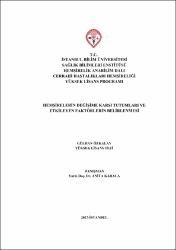Hemşirelerin değişime karşı tutumları ve etkileyen faktörlerin belirlenmesi
Künye
Özkalay G. (2017). Hemşirelerin değişime karşı tutumları ve etkileyen faktörlerin belirlenmesi. Yayımlanmamış yüksek lisans tezi. İstanbul: İstanbul Bilim Üniversitesi, Sağlık Bilimleri Enstitüsü.Özet
Amaç: Bu araştırma, hemşirelerin değişime karşı tutumlarını ve tutumları etkileyen sosyo-demografik, mesleki ve çalışma yaşamına ilişkin özellikleri belirlemek amacıyla gerçekleştirildi.
Gereç ve Yöntem: Bu çalışma tanımlayıcı nitelikte bir araştırmadır. Araştırmanın örneklemini 1 Eylül-1 Aralık 2016 tarihleri arasında İstanbul’da bulunan bir vakıf hastanesinde çalışan ve araştırmaya katılmayı kabul eden 401 hemşire oluşturdu. Araştırma verileri “Hemşire Bilgi Formu” ve “Değişime Karşı Tutum Ölçeği (DKTÖ)” ile toplandı. DKTÖ, 29 maddeden oluşan bir ölçek olup ölçek puanının yükselmesi hemşirelerin değişime karşı tutumlarının olumlu yönde olduğunu göstermektedir. Araştırma veriler SPSS 16.0 programında değerlendirildi.
Bulgular: Hemşirelerin yaş ortalamalarının 26,18±5,408 olduğu, %88'inin (n=353) kadın, %74,6’sının (n=299) bekar, %51,1’inin (n=205) lisans mezunu olduğu saptandı. Araştırmaya katılan hemşirelerin %31,2’sinin (n=125) çalıştığı kurumda yapılan değişim faaliyetleri ile ilgili sorumluluk aldığı, %69,6’sı (n=279) değişimin çalışanları mesleki açıdan gelişmeleri için motive edeceğini belirtmiştir. Ölçeğin tamamı için yapılan güvenirlik analizi sonucunda güvenirlik katsayısının 0,939 olduğu belirlendi. Hemşirelerin DKTÖ puanlarına göre aldıkları en yüksek puan (3,76±0,912) “Değişim sürecinde elde edilen sonuçların paylaşılması, değişimi kabulümü kolaylaştırıyor” maddesi alırken, en düşük puanı (2,47±1,084) “Değişim ile ilgili istenen davranışı gösterdiğimde ödüllendiriliyorum” maddesinin aldığı görüldü.
Sonuç: Hemşirelerin değişime karşı tutumlarının orta düzeyde olduğu belirlenmiştir. Hemşirelerin sosyo-demografik ve çalışma yaşamına ilişkin bazı özelliklerin hemşirelerin değişime karşı tutumlarını etkilemektedir Purpose: This research was planned in order to determine the attitudes of nurses against change, and the affecting their attitudes the socio-demographic, occupational and work life features.
Tools and Methods: This study is a descriptive study as far as quality is concerned. The sample group of the study was composed of 401 nurses who work at a foundation hospital in Istanbul and who agreed to participate in the study between September 1st and December 1st, 2016. The data of the research was collected via “Nurse Information Form” and “Attitude Scale Against Change (ASAC)”. ASAC consista of made up 29 iteus, and the higher the scale is the more likely the nurses are positive against change. The data of the research was analysed with SPSS 16.0 software.
Findings: It was determined that average of the ages of the nurses were 26,18±5,408, that 88% (n=353) of them were women, and that 74,6% (n=299) were single, that 51,1% (n=205) of them were undergraduates. It was seen that the nurses that 31,2% (n=125) of the nurses took responsibility with regard to change and that 69,6% (n=279) of them think change would motivate them for occupational improvement. As a result of the reliability analysis it was determined that the reliability coefficient was 0,939. According to ASAC, the nurses took the highest point (3,76±0,912) in “Sharing the results obtained in the period of change assists in acceptance of the change”, and they got the lowest point (2,47±1,084) in “I am being rewarded when I show the expected result about change.”
Conclusion: It was determined that the attitude of the nurses against change is at a medium level. Some specialties of the nurses regarding the socio-economic and work life affect their attitudes against change.


















